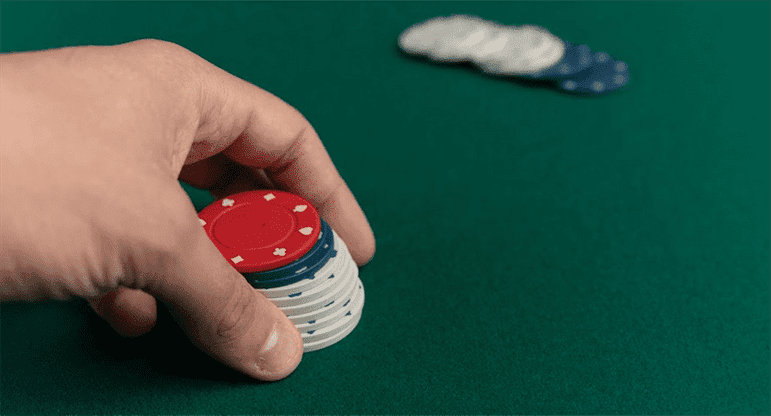A Beginner’s Guide to Playing Poker is a comprehensive guide that provides an introduction to the game of poker. It covers the basic rules, strategies, and terminology of the game, making it an ideal resource for those who are new to the game or looking to improve their skills. The guide also includes tips on how to read your opponents, manage your bankroll, and avoid common mistakes. Whether you’re playing for fun or looking to become a professional poker player, this guide is a great place to start.
5 Essential Tips for Beginners to Improve Their Poker Game
Poker is a game that has been around for centuries and has become increasingly popular in recent years. It is a game of skill, strategy, and luck, and can be played in a variety of formats, from casual home games to high-stakes tournaments. If you are new to the game, it can be overwhelming to know where to start. Here are five essential tips for beginners to improve their poker game.
1. Learn the Rules
The first step to playing poker is to learn the rules. There are many variations of the game, but the most popular is Texas Hold’em. In this game, each player is dealt two cards face down, and then five community cards are dealt face up in the middle of the table. The goal is to make the best five-card hand using your two cards and the five community cards.
It is important to understand the different hands and their rankings. The highest hand is a royal flush, which consists of a 10, jack, queen, king, and ace of the same suit. The lowest hand is a high card, which is simply the highest card in your hand.
2. Practice Bankroll Management
Bankroll management is crucial to being a successful poker player. It involves managing your money and knowing when to bet and when to fold. It is important to set a budget for yourself and stick to it. You should never bet more than you can afford to lose.
It is also important to know when to walk away from a game. If you are on a losing streak, it may be time to take a break and come back another day. Similarly, if you are winning, it is important to know when to quit while you are ahead.
3. Pay Attention to Your Opponents
One of the keys to being a successful poker player is to pay attention to your opponents. You should be observing their behavior and trying to read their hands. Look for patterns in their betting and try to figure out what they are holding.
It is also important to be aware of your own behavior. Try to avoid giving away any tells that may give your opponents an advantage. This includes things like fidgeting, looking at your cards too often, or making sudden movements.
4. Know When to Bluff
Bluffing is an important part of poker, but it should be used sparingly. It involves making a bet or raise with a weak hand in order to make your opponents think you have a stronger hand than you actually do.
The key to bluffing is to know when to do it. You should only bluff when you have a good reason to believe that your opponents will fold. This may be because they have shown weakness in their betting or because the board is favorable to your hand.
5. Practice, Practice, Practice
Finally, the best way to improve your poker game is to practice. This can be done by playing in home games with friends or by playing online. There are many websites that offer free poker games where you can practice your skills without risking any money.
It is also important to study the game. There are many books and websites that offer tips and strategies for improving your poker game. By reading and learning from the experts, you can improve your skills and become a better player.
In conclusion, poker is a game that requires skill, strategy, and luck. By following these five essential tips, beginners can improve their game and become successful players. Remember to learn the rules, practice bankroll management, pay attention to your opponents, know when to bluff, and practice, practice, practice. With time and dedication, anyone can become a great poker player.
Understanding the Basic Rules of Poker: A Beginner’s Guide
Poker is a popular card game that has been played for centuries. It is a game of skill, strategy, and luck. If you are new to poker, it can be overwhelming to learn the rules and strategies. However, with a little bit of practice and patience, you can become a skilled poker player.
The first step in learning how to play poker is to understand the basic rules. Poker is played with a standard deck of 52 cards. The goal of the game is to win the pot, which is the sum of all the bets made by the players in a hand.
Each player is dealt two cards face down, which are called the hole cards. Then, five community cards are dealt face up in the middle of the table. These cards are called the flop, turn, and river. The players use their hole cards and the community cards to make the best possible five-card hand.
The game begins with the player to the left of the dealer, who is called the small blind, placing a bet. The player to their left, called the big blind, places a larger bet. Then, each player has the option to call, raise, or fold.
If a player calls, they match the amount of the previous bet. If they raise, they increase the amount of the previous bet. If they fold, they forfeit their hand and any bets they have made.
Once all the bets have been made, the remaining players reveal their hands. The player with the best hand wins the pot.
There are many different variations of poker, each with their own rules and strategies. However, the basic rules of poker remain the same.
One of the most important skills in poker is knowing when to bet and when to fold. It is important to pay attention to the other players at the table and their betting patterns. If a player is consistently raising, they may have a strong hand. If a player is consistently folding, they may have a weak hand.
Another important skill in poker is bluffing. Bluffing is when a player makes a bet or raises with a weak hand in order to make the other players think they have a strong hand. This can be a powerful strategy, but it is important to use it sparingly and only when the situation calls for it.
In addition to the basic rules and strategies, there are also etiquette rules that should be followed when playing poker. It is important to be respectful to the other players at the table and to follow the rules of the game.
Overall, learning how to play poker takes time and practice. It is important to start with the basic rules and strategies and to gradually build your skills. With patience and dedication, you can become a skilled poker player and enjoy the excitement and challenge of this popular card game.
The Importance of Bankroll Management for Beginner Poker Players
Poker is a game of skill, strategy, and luck. It is a game that has been played for centuries and has evolved into many different variations. For beginners, it can be overwhelming to learn all the rules and strategies of the game. However, one of the most important aspects of playing poker is bankroll management.
Bankroll management is the process of managing your money while playing poker. It is essential for beginners to understand the importance of bankroll management because it can make or break your poker career. Without proper bankroll management, you can quickly lose all your money and be forced to quit playing.
The first step in bankroll management is setting a budget. You should decide how much money you are willing to spend on poker and stick to that budget. It is important to remember that poker is a game of variance, and you will experience both winning and losing streaks. Therefore, you should only play with money that you can afford to lose.
Once you have set your budget, you should decide on the stakes you want to play. The stakes you choose should be based on your bankroll. As a beginner, it is recommended that you start with low stakes games. This will allow you to gain experience and improve your skills without risking too much money.
Another important aspect of bankroll management is knowing when to move up or down in stakes. If you are consistently winning at a particular stake level, you may consider moving up to a higher stake level. However, if you are consistently losing, you should move down to a lower stake level. This will help you avoid losing all your money and allow you to continue playing.
It is also important to keep track of your wins and losses. You should keep a record of all your poker sessions, including the amount of money you won or lost. This will help you track your progress and identify any areas where you need to improve.
In addition to bankroll management, there are other strategies that beginners can use to improve their poker game. One of the most important strategies is to pay attention to your opponents. You should observe their playing style and try to identify any patterns or tendencies. This will help you make better decisions and increase your chances of winning.
Another important strategy is to be patient. Poker is a game of patience, and you should not rush into making decisions. Take your time to analyze the situation and make the best decision based on the information available.
In conclusion, bankroll management is an essential aspect of playing poker for beginners. It is important to set a budget, choose the right stakes, and keep track of your wins and losses. By following these strategies, beginners can improve their poker game and increase their chances of winning. Remember, poker is a game of skill, strategy, and luck, and with proper bankroll management, you can become a successful poker player.
How to Read Your Opponents in Poker: A Beginner’s Guide
Reading your opponents is the art of understanding their behavior, body language, and betting patterns to determine what kind of hand they have. It’s a crucial skill that separates the amateurs from the professionals. In this beginner’s guide, we’ll take a look at some tips and tricks to help you read your opponents and improve your game.
The first thing you need to do is pay attention to your opponents. Watch how they behave when they’re dealt their cards. Do they look excited or nervous? Are they fidgeting or sitting still? These are all clues that can help you determine what kind of hand they have.
Next, pay attention to their betting patterns. Do they bet aggressively or conservatively? Are they raising or calling? These actions can give you an idea of what kind of hand they have. For example, if someone is betting aggressively, they may have a strong hand. If they’re calling, they may have a weaker hand.
Another important factor to consider is their position at the table. Players who are in early position (the first few players to act) are at a disadvantage because they have less information about the other players’ hands. Players in late position (the last few players to act) have an advantage because they have more information and can make more informed decisions.
Body language is also an important factor to consider when reading your opponents. Watch for any signs of nervousness, such as sweating or shaking. These can be indications that they have a weak hand. Conversely, if someone is sitting still and not showing any signs of nervousness, they may have a strong hand.
One of the most important things to remember when reading your opponents is to not rely solely on one factor. Instead, use a combination of factors to make an informed decision. For example, if someone is betting aggressively, in late position, and not showing any signs of nervousness, they may have a strong hand.
It’s also important to remember that your opponents are trying to read you as well. So, be aware of your own behavior and betting patterns. Try to mix things up and keep your opponents guessing.
In conclusion, reading your opponents is a crucial skill in poker. It takes time and practice to master, but with these tips and tricks, you’ll be on your way to becoming a better player. Remember to pay attention to your opponents’ behavior, betting patterns, position at the table, and body language. And, don’t forget to mix things up and keep your opponents guessing. Good luck at the tables!
Common Mistakes to Avoid as a Beginner Poker Player
One of the most common mistakes that beginner poker players make is playing too many hands. It’s important to remember that not every hand is worth playing. You should only play hands that have a good chance of winning. This means that you should fold more often than you play. Don’t be afraid to fold if you have a weak hand.
Another mistake that many beginner poker players make is not paying attention to their opponents. It’s important to observe your opponents and try to figure out their playing style. This will help you make better decisions when it comes to betting and calling. If you can figure out your opponent’s playing style, you can use that information to your advantage.
A third mistake that many beginner poker players make is not managing their bankroll properly. It’s important to set a budget for yourself and stick to it. Don’t play with money that you can’t afford to lose. You should also avoid chasing losses. If you’re on a losing streak, it’s better to take a break and come back another day.
Another common mistake that beginner poker players make is playing too aggressively. While it’s important to be confident and assertive at the poker table, you don’t want to be reckless. Don’t bet too much money on a hand that you’re not sure about. It’s better to play it safe and wait for a better opportunity.
Finally, many beginner poker players make the mistake of not knowing when to quit. It’s important to know when to walk away from the table. If you’re on a winning streak, it’s tempting to keep playing and try to win even more money. However, this can lead to overconfidence and ultimately, losing all of your winnings. It’s important to set a goal for yourself and stick to it. Once you’ve reached your goal, it’s time to walk away.
In conclusion, playing poker can be a fun and exciting experience. However, as a beginner poker player, it’s important to avoid common mistakes that many players make. By playing fewer hands, paying attention to your opponents, managing your bankroll properly, playing smart, and knowing when to quit, you can improve your game and increase your chances of winning. Remember, poker is a game of skill, strategy, and luck. With practice and patience, you can become a successful poker player.
The Different Types of Poker Games and Which Ones to Try as a Beginner
Poker is a game that has been around for centuries and has evolved into many different variations. As a beginner, it can be overwhelming to decide which type of poker game to try first. In this article, we will explore the different types of poker games and which ones are best suited for beginners.
Texas Hold’em is the most popular type of poker game and is played in most casinos and online poker rooms. It is a community card game where each player is dealt two cards face down, and then five community cards are dealt face up in the middle of the table. The objective of the game is to make the best five-card hand using any combination of the two cards in your hand and the five community cards. Texas Hold’em is a great game for beginners because it is easy to learn and there are plenty of resources available to help you improve your skills.
Omaha is another popular type of poker game that is similar to Texas Hold’em. The main difference is that each player is dealt four cards face down instead of two. Players must use two of their four cards and three of the five community cards to make the best five-card hand. Omaha is a more complex game than Texas Hold’em, and it is recommended that beginners start with Texas Hold’em before moving on to Omaha.
Seven Card Stud is a classic poker game that was popular before Texas Hold’em became the dominant game. In Seven Card Stud, each player is dealt seven cards, three face down and four face up. The objective of the game is to make the best five-card hand using any combination of the seven cards. Seven Card Stud is a more challenging game than Texas Hold’em and Omaha, and it is recommended that beginners have some experience playing poker before trying this game.
Razz is a variation of Seven Card Stud where the objective is to make the lowest possible hand. Players are dealt seven cards, and the lowest five-card hand wins. Razz is a fun game to play, but it is not recommended for beginners as it requires a good understanding of hand rankings and strategy.
Five Card Draw is a simple poker game where each player is dealt five cards face down. Players have the opportunity to discard and replace any of their cards in an attempt to make the best five-card hand. Five Card Draw is a great game for beginners because it is easy to learn and there are fewer variables to consider compared to other poker games.
As a beginner, it is important to choose a poker game that suits your skill level and interests. Texas Hold’em and Five Card Draw are great games to start with because they are easy to learn and there are plenty of resources available to help you improve your skills. Once you have gained some experience playing these games, you can move on to more complex games like Omaha and Seven Card Stud.
In conclusion, there are many different types of poker games to choose from, and it can be overwhelming for beginners to decide which one to try first. Texas Hold’em and Five Card Draw are great games to start with, while Omaha and Seven Card Stud are more complex and require more experience. It is important to choose a game that suits your skill level and interests, and to take advantage of the many resources available to help you improve your skills. With practice and dedication, anyone can become a successful poker player.
A Beginner’s Guide to Playing Poker is a comprehensive resource for those who are new to the game. It covers everything from the basic rules to advanced strategies, and provides tips and advice for players of all skill levels. Whether you’re looking to play for fun or to compete at a high level, this guide has something for everyone. With its clear and concise explanations, helpful illustrations, and practical advice, A Beginner’s Guide to Playing Poker is an essential tool for anyone who wants to improve their game and become a better player.




